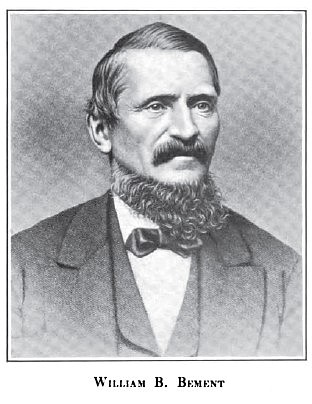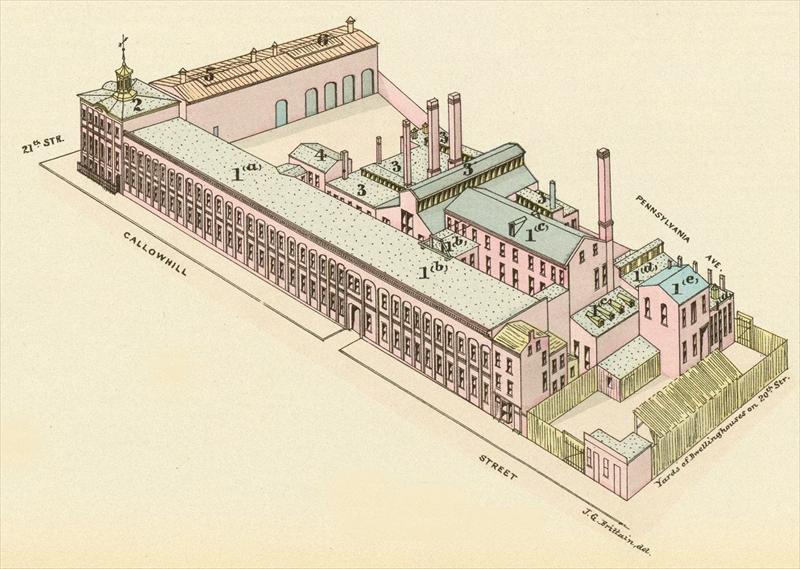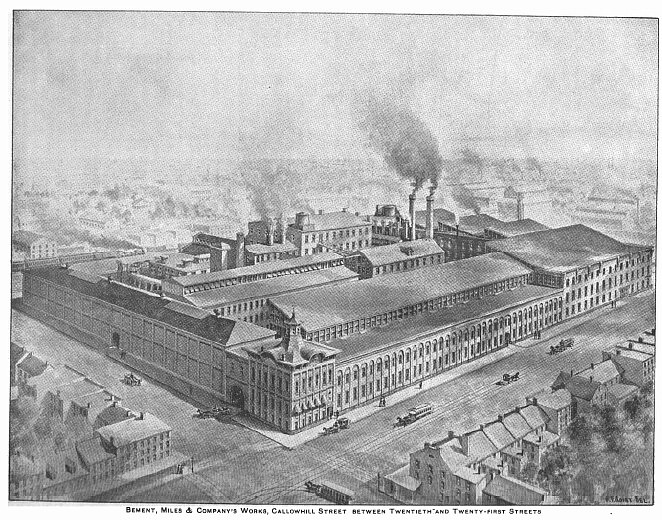Manufacturers Index - Bement, Miles & Co.
Bement, Miles & Co.
Philadelphia, PA, U.S.A.
Manufacturer Class:
Metal Working Machinery
Last Modified: Aug 13 2025 7:56AM by Jeff_Joslin
If you have information to add to this entry, please
contact the Site Historian.
|

In 1848 Elijah D. Marshall established E. D. Marshall & Co. to engrave rolls used in printing fabrics. In 1851 he took William B. Bement, who had been chief machine designer for the Lowell Machine Shops, as a partner, along with Bement's nephew, Gilbert A. Colby, and began manufacturing machine tools under the name of Marshall, Bement & Colby. In 1854, James Dougherty and George C. Thomas became partners and the name changed to Bement, Colby, Dougherty & Co. The following year, Colby and Marshall left and the name changed to Bement, Dougherty & Thomas and then Bement & Dougherty. Thomas had provided considerable capital that allowed the business to improve their factory and machinery, and they steadily grew to be very successful. In 1870, Dougherty left and Bement's son, Clarence S. Bement, joined the firm, which became William B. Bement & Son.
Frederick B. Miles worked for Bement & Dougherty and then left in 1870 to establish another machine tool maker, Ferris & Miles, which in about 1880 was acquired by James Dougherty, who renamed it to the Machine Tool Works. Both before and after the name change, Miles make a series of improvements to the steam hammer. In 1885 the Machine Tool Works consolidated with William Bement & Son, forming Bement, Miles & Co. This consolidated business manufactured lathes, planers, shapers, slotters, milling machines, and steam hammers. Their products tended to the large and the very large.
Bement died in 1897, and in 1900 the business merged with others to become the Niles-Bement-Pond Co.

William B. Bement & Son Industrial Works

Bement, Miles & Co.
Information Sources
- English & American Tool Builders by Joseph Wickham Roe 1916, Yale University Press.
William B. Bement, the son of a Connecticut farmer and blacksmith, was born at Bradford, N. H., in 1817. His education was obtained in the district schools and in his father's blacksmith shop. His mechanical aptitude was so clear that he was apprenticed to Moore & Colby, manufacturers of woolen and cotton machinery at Peterboro, N. H. His progress at first was rapid. Within two years he became foreman, and on the withdrawal of one of the partners, was admitted into the firm. He continued there three years, already giving much thought to machine tools, for which he saw the rising need. In 1840 he went to Manchester and entered the Amoskeag shop when it was just finished, remaining there two years as a foreman and contractor under William A. Burke, to whom we have referred elsewhere. From there Bement went to take charge of a shop for manufacturing woolen machinery at Mishawaka, Ind. Unfortunately it was burned to the ground while Bement had gone back to New Hampshire for his family, so that when he returned with them he found himself without employment and with only ten dollars in hand. For the time being he worked as a blacksmith and gunsmith, and made an engine lathe for himself in the shop of the St. Joseph Iron Company, which gave him permission to use their tools in return for the use of his patterns to make a similar machine for themselves. Much of the work in making this lathe was done by hand as there was no planer within many hundred miles. The St. Joseph Iron Company, seeing his work, offered him the charge of their shop, to which he agreed, provided the plant were enlarged and equipped with proper tools. This was done, but just as everything was completed this plant also was burned down. Bement had plans for another shop ready the following day, went into the woods with others, cut the necessary timber, and a new shop was soon completed. He remained there for three years, constructing a variety of machine tools, one of which was a gear cutter said to have been the first one built in the West, or used beyond Cleveland.
He returned to New England as a contractor in the Lowell Machine Shop under Burke, who had gone there from the Amoskeag Mills in 1845. On account of Bement's resourcefulness and skill in designing, Burke induced him to relinquish his contracts and take charge of their designing, which he did for three years, his residence at Lowell covering in all about six years.
In 1851 Elijah D. Marshall, who had established a business of engraving rolls for printing calicos in 1848 and had a small shop at Twentieth and Callowhill Streets in Philadelphia, offered Bement a partnership. He moved to Philadelphia in September of that year, and with Marshall and Gilbert A. Colby, a nephew, he began the manufacture of machine tools under the name of Marshall, Bement & Colby, thus starting only a year or so after Sellers. Marshall was a large man, dignified and deliberate in speech. Bement was strong, vigorous, a born designer, a remarkably rapid draftsman, and had a capacity for work rarely equalled. Colby was also a man of considerable mechanical ability, with advanced business ideas. Their shop consisted of a single three-storied, stone, whitewashed building, 40 by 90 feet. Their entire machine shop was on the first floor, with a 10- by 12-foot room for an. office. The engine, boiler and blacksmith shop were in small outbuildings. Part of the second floor was rented to another factory and the rest was sometimes used for religious meetings, while the third floor was used for engraving printing rolls. Their tools were few and crude; among them were a 36-inch lathe with a wooden bed and iron straps for ways, and a 48-inch by 14-foot planer with ornate Doric uprights. Marshall and Colby soon retired, the latter going to Niles, Mich., where he was very successful. James Dougherty, an expert foundryman, and George C. Thomas entered the firm, which became Bement & Dougherty, the plant being known as the "Industrial Works." Mr. Thomas contributed considerable capital, and a new shop and a foundry were built. At the same time they installed a planer 10 feet wide by 8 feet high, to plane work 45 feet long, a notable tool for that day.
After a few years of struggle, the plant began to grow rapidly and at one time was the largest of its kind in the country. Bement and Sellers were among the first to concentrate wholly on tool building. They confined themselves to work of the highest quality. Both made much heavier tools, as we have said, than the New England builders their only competitors, and in a short time had established great reputations. Bement relied little on patent protection, trusting to quality and constant improvement. Thomas retired from the partnership in 1856 and Dougherty in 1870; and Clarence S. Bement joined the firm, which became William B. Bement & Son. John M. Shrigley became a partner in 1875, William P. Bement in 1879, and Frank Bement in 1888.
...Frederick B. Miles was an employee of Bement & Dougherty who established a tool business under the name of Ferris & Miles, which afterward became the Machine Tool Works. While head of these works, Miles greatly improved the steam hammer, particularly its valve mechanism, and many details of what is known as the Bement hammer were invented by Miles. In 1885 the Machine Tool Works consolidated with William Bement & Son, forming Bement, Miles & Company. Mr. Miles was an accomplished engineer and designer, with the unusual equipment of six languages at his command, an asset of value in the firm's foreign business. William Bement, Senior, died in 1897, and in 1900 the business became a part of the Niles-Bement-Pond Company. Mr. Miles retired at that time and has not since been active in the tool business.
- American Lathe Builders: 1810-1910 by Kenneth L. Cope, 2001
- American Milling Machine Builders: 1820-1920 by Kenneth L. Cope, 2007
- American Planer, Shaper and Slotter Builders by Kenneth L. Cope, 2002
- Philadelphia and popular Philadelphians by The North American, 1891.
The establishment of Bement, Miles & Co., which covers a large area of valuable ground in the city of Philadelphia, consists of two properties, the larger located on Callowhill street between Twentieth and Twenty-first streets, and bounded on the north by the Philadelphia and Reading Railroad, and the smaller situated at the corner of Twenty-fourth and Wood streets, running 240 feet east by 170 feet north. The space is compactly covered by buildings two and three stories in height, which afford occupation in busy times to not less than one thousand men.
As early as 1848 a small three-story stone building, more or less surrounded with dwellings, stood near the centre of the Callowhill street property, and was then more than sufficient for the small business of the firm of Marshall & Teal, who owned the business. In 1851 Mr. E. D. Marshall invited William Barnes Bement to join him, with a view of introducing the manufacture of machine tools. Mr. Bement was then employed in the Lowell Machine Shop, at Lowell, Mass., priucipally in designing machine tools. He accepted the invitation of Mr. Marshall, with the understanding that he should bring with him his nephew, Mr. G. A. Colby, and a copartnership under the firm name of Marshall, Bement & Colby was the result. After three years of experience, it was decided that the machine shop should be supplemented by a foundry, and Mr. James Dougherty, whose experience in this line was very valuable, and who in after years added much to the standing of the concern, was admitted into the firm, its name being then Bement, Colby & Dougherty. Subsequently Mr. Colby retired, and Mr. George C. Thomas was admitted, the name being changed to Bement, Dougherty & Thomas. In a few years Mr. Thomas' interest was purchased by the remaining partners, and the firm name of Bement & Dougherty continued until 1870, when Mr. Dougherty reretired, and Mr. Clarence S. Bement, son of the senior partner, was admitted. The firm name then became Messrs. William B. Bement & Son. In 1874 Mr. John M. Shrigley was made a partner, and in 1879 Mr. William P. Bement was also admitted, the firm still remaining William B. Bement & Son. About the beginning of 1885 Mr. Shrigley retired, and during that year a consolidation of the works of William B. Bement & Son, and the machine tool works owned by Mr. James Dougherty and Mr. Frederick B. Miles was effected. Mr. Dougherty's interest was purchased, and the new firm conducted business under the title of Messrs. Bement, Miles & Co. In 1887 the original founder, Mr. William B. Bement, retired from active business and his son, Frank Bement, entered the firm. Since that time no change has been made, and the firm as it stands to-day, consists of Clarence S. Bement, Frederick B. Miles, William P. Bement, and Frank Bement. The manufacture of machine tools at this establishment which commenced so humbly in 1851, increased so rapidly that, some years before the Civil War, the establishment had attained a national reputation, as the determination of the firm from the start was to produce the best designs and workmanship with a view of supplying the wants of those customers only who required machines of the most perfect construction. As time went on, new and improved patterns were added to the list, and now the standard machines constructed by the firm number not less than three hundred. About two years ago the demand for larger tools than could be properly produced in the old establishment led to an extensive addition, which was to be filled with heavy machinery, and supplied with large traveling cranes for erecting. This extension has added so largely to the capacity of the establishment that if the various machine shops proper could be assembled into one, they would constitute a room 100 feet wide by about 1250 feet long.
At the present time the larger works are engaged in building miscellaneous tools for locomotive and railroad shops, forges and ship building establishments, while the Twenty-fourth street shop is mainly occupied with steam hammers, hydraulic machinery, and boiler makers' tools.
|